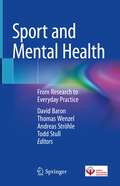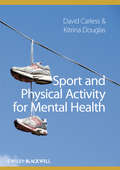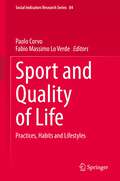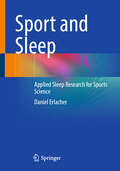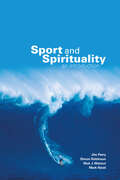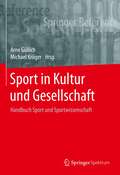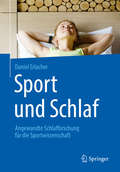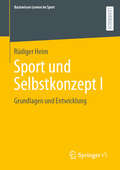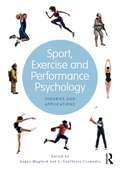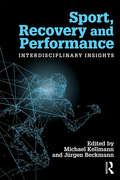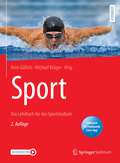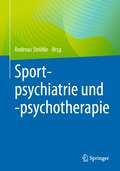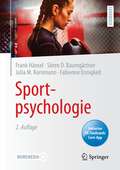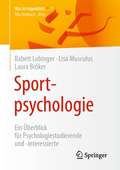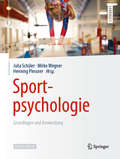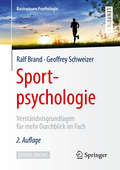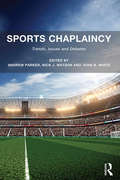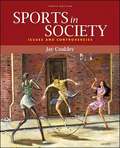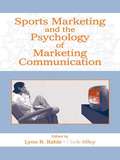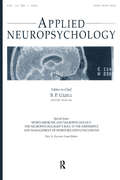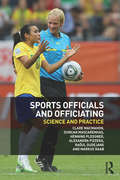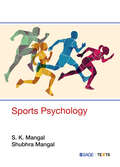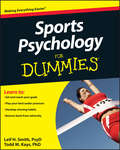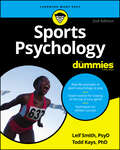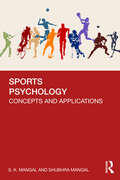- Table View
- List View
Sport and Mental Health: From Research to Everyday Practice
by David Baron Thomas Wenzel Andreas Ströhle Todd StullThis user-friendly, comprehensive and highly relevant book allows readers to gain a better understanding of mental health issues in sport and exercise. The field of sports psychiatry continues to grow globally at a rapid pace. This, in part, can be explained by the changing culture of sport leading to an appreciation of the role of psychiatric symptoms and syndromes in the world of sport, but also the increasing spread of both highly performance oriented and grass-roots basic sports and the associated risks in large sections of the population. The long-standing stigma attached to mental health problems, such as depression, anxiety, ADHD, suicide, brain injuries, substance-abuse, is being challenged not only by high-profile athletes, but also in public health and general mental health services. The book utilizes an innovative case-based and structured didactical format to provide short summaries of recent research by leading experts in the respective fields, as well as up-to date prevention and clinical guidelines for all relevant disorders in a way that is easily accessible to the large and growing groups interested and active in sports. This work is relevant for all mental health professionals and can also be used by a wider readership including medical doctors, psychologists, athletes and coaches. A second volume covers the role of exercise as an effective treatment for a number of common psychiatric conditions, such as depression, anxiety, eating disorders and substance abuse.
Sport and Physical Activity for Mental Health
by Kitrina Douglas David CarlessWith approximately 1 in 6 adults likely to experience a significant mental health problem at any one time (Office for National Statistics), research into effective interventions has never been more important. During the past decade there has been an increasing interest in the role that sport and physical activity can play in the treatment of mental health problems, and in mental health promotion. The benefits resulting from physiological changes during exercise are well documented, including improvement in mood and control of anxiety and depression. Research also suggests that socio-cultural and psychological changes arising from engagement in sport and physical activity carry valuable mental health benefits. Sport and Physical Activity for Mental Health is an evidence-based practical guide for nurses, allied health professionals, social workers, physical activity leaders, and sport coaches. The authors provide comprehensive analysis of a broad range of client narratives, integrating theory and the latest research to explore the effectiveness of various interventions. The book offers readers detailed recommendations, suggestions, and ideas as to how sport and physical activity opportunities can be tailored to provide the greatest mental health benefits.
Sport and Quality of Life: Practices, Habits and Lifestyles (Social Indicators Research Series #84)
by Paolo Corvo Fabio Massimo Lo VerdeThis book brings together essays analyzing the impact of sport and physical activity on psychophysical well-being and quality of life, through multidisciplinary and multi-country studies. It discusses how the commercial dimension of sport entertainment and recreational dimension of sport practice have been increasingly brought together in discussions on individual health and well-being, and social integration and participation. It therefore considers the relationship between sports practice, enjoyment of sporting events, sport participation and quality of life. The chapters examine various aspects of the practice of sport for professional and recreational purposes from the perspective of age, life course research, physical education in schools, government investment in sport activities across various stages of life, the rise of sports tourism as a global industry and how social networks and web apps are changing the perception of fitness. This innovative book is of interest to scholars and students of sport science, leisure studies, and well-being research.
Sport and Sleep: Applied Sleep Research for Sports Science
by Daniel ErlacherAt first glance, sport and sleep appear to be two topics that could hardly be more different: Physical and mental peak performance on the one hand - inactivity and unconsciousness on the other. This book is dedicated to this new issue and uses various examples from sports practice to show that there are numerous points of contact here. A theoretical section at the beginning introduces the basics of sports science and sleep research, while the much larger section is dedicated to its application in a sporting environment. Among other things, the sleep behaviour of athletes is presented, including how jet lag in sport and sleep deprivation can become noticeable before sporting performances and competitions. It also deals with the dream experience of motorised actions and training in lucid dreams. The book is aimed at those interested in sports science, sleep medicine, psychology and neurology, as well as trainers and sports enthusiasts who would like to read up on the subject in moredetail.
Sport and Spirituality: An Introduction
by Simon Robinson Nick Watson Jim Parry Mark NestiSport science can quantify many aspects of human performance but the spiritual dimensions of sports experience cannot be fully understood through measurement. However, the spiritual experience of sport – be it described as ‘flow’, ‘transcendence’ or the discovery of meaning and value – is central both to our basic motivation to take part in sports, and to achieving success. Sport and Spirituality: An Introduction explores these human aspects of sports experience through the perspectives of sport psychology, philosophy, ethics, theology and religious studies. It includes discussions of: Spirituality in the postmodern era Spirituality, health and well-being Theistic and atheistic perspectives on sport and the spiritual Nature and transcendence – the mystical and sublime in outdoor sport Applied sport psychology and the existential Spiritual perspectives on pain, suffering and destiny Sport, the virtues, ethical development and the spirit of the game The Olympic Games and de Coubertin’s ideas of the ‘religio athletae’. This groundbreaking text will be a valuable resource for students of sport and exercise studies, sports coaching, physical education and sport and health psychology. This book should be read by all those interested in the preparation, performance and well-being of athletes.
Sport in Kultur und Gesellschaft: Handbuch Sport und Sportwissenschaft
by Michael Krüger Dieter Hackfort Eike Emrich Freya Gassmann Christian PierdziochDieses Handbuch bietet einen kompletten Überblick über die zentralen Themen der Sozialwissenschaften im Sport. Es richtet sich an das breite Publikum der Fachleute, Lehrenden und Wissenschaftler*innen in Sport und Sportwissenschaft. Hier können Sie sich kompakt und kompetent über den Stand der Wissenschaft zur Kultur des Sports informieren. Das Handbuch ersetzt bisherige Lexika und Handbücher zum Sport. Die Texte sind verständlich formuliert und anschaulich aufbereitet. Die knapp 50 Kapitel in diesem Band geben Ihnen den aktuellsten wissenschaftlichen Stand über die ökonomischen, sozialen, kulturellen, politischen, rechtlichen, pädagogischen und psychologischen Zusammenhänge des Sports. Zudem erhalten Sie Hinweise auf die wichtigste nationale und internationale Forschungsliteratur. Die Herausgeber: Arne Güllich ist Professor für Sportwissenschaft und leitet das Fachgebiet Sportwissenschaft an der TU Kaiserslautern. Er forscht in den Bereichen Jugendsport, Talententwicklung, Training und Förderstrukturen. Güllich hat zuvor im Deutschen Olympischen Sportbund als Leiter der Stabsstelle Grundsatzfragen gearbeitet. Praxiserfahrungen hat er als Trainer vom Jugendbereich bis zu den Olympischen Spielen gesammelt. Michael Krüger ist Professor für Sportwissenschaft an der Westfälischen Wilhelms-Universität zu Münster. Seine Forschungsschwerpunkte liegen im Bereich der Sportpädagogik und -geschichte, der wissenschaftstheoretischen Grundlagen der Sportwissenschaft, der olympischen Geschichte und Erziehung sowie von ethischen und pädagogischen Fragen des Sports. Er ist Verfasser und Herausgeber zahlreicher wissenschaftlicher Arbeiten zum Sport sowie mehrerer Lehr- und Handbücher zur Sportwissenschaft und Sportpädagogik.
Sport und Schlaf: Angewandte Schlafforschung für die Sportwissenschaft
by Daniel ErlacherSport und Schlaf scheinen auf den ersten Blick zwei Themen, die unterschiedlicher kaum sein können: Körperliche sowie mentale Höchstleistungen auf der einen Seite – Inaktivität und Bewusstlosigkeit auf der anderen. Dieses Buch widmet sich diesem neuen Sachverhalt und zeigt anhand unterschiedlicher Beispiele aus der Sportpraxis, dass es hier zahlreiche Anknüpfungspunkte gibt. Ein theoretischer Teil führt zu Beginn in die Grundlagen der Sportwissenschaft und Schlafforschung ein, der weitaus größere Teil widmet sich der Anwendung im sportlichen Umfeld. Unter anderem wird das Schlafverhalten von Athletinnen und Athleten vorgestellt, wie sich Jet Lag im Sport und Schlafdeprivation vor sportlichen Leistungen als auch vor Wettkämpfen bemerkbar machen kann. Ebenso werden das Traumerleben von motorischen Handlungen sowie das Training im Klartraum behandelt. Das Buch richtet sich an Interessierte aus der Sportwissenschaft, Schlafmedizin, Psychologie, Neurologie, aber auch an Trainer und Trainerinnen, sowie an sporttreibenden Personen, die sich hier fundierter einlesen möchten.
Sport und Selbstkonzept I: Grundlagen und Entwicklung (Basiswissen Lernen im Sport)
by Rüdiger HeimSeit langem wird dem Sport eine förderliche Wirkung auf das Selbstkonzept, insbesondere im Kindes- und Jugendalter, zugeschrieben. Allerdings sind die entsprechenden wissenschaftlichen Befunde mittlerweile weit verzweigt und unübersichtlich. Dieses Lehrbuch gibt einen kompakten Überblick über die sportbezogene Selbstkonzeptforschung und ihre theoretischen wie empirischen Erträge. Im Mittelpunkt dieses ersten Bandes steht eine übersichtliche Darstellung des mehrdimensionalen Modells des Selbstkonzepts und seiner Entwicklung sowie der Bedeutung für das Sportengagement.
Sport, Exercise, and Performance Psychology: Theories and Applications
by J. Gualberto Cremades Angus MugfordThis book brings together world-class professionals to share theoretical understanding applied to sport, exercise and performance domains. It highlights how to be more effective in developing psychological skills, context and understanding for educators, students and professionals. From both academic and practitioner perspectives, this book takes readers through contextual understanding of this field of study and into a wide variety of important areas. Specifically, the chapters focus on the mind-body relationship and performance challenges, and on core mental skills applied across different sport, exercise and performance examples (including professional athletes, normal exercise populations and military service members). The final section expands the context into the role of relationships and performance in group settings to cover a broad practice of modern day applied performance psychology.
Sport, Recovery, and Performance: Interdisciplinary Insights
by Michael Kellmann Jürgen BeckmannSport, Recovery and Performance is a unique multi-disciplinary collection which examines both the psychological and physiological dimensions to recovery from sport. Including contributions from medicine, neuroscience, psychology and sport science, the book expertly explores the implications for applied and strategic interventions to both retain and stabilize performance, and promote health and well-being. Including chapters written by its leading experts, the book represents an important milestone in this evolving field of study. It covers issues around measuring recovery, the impact of overtraining on sleep and mental health, and addresses topics such as the impact of travel on performance. The book informs not only how managing recovery can improve performance, but also offers insights in how recovery can sustain athletes’ physical and mental health. Citing research from a range of individual and team sports, as well as extreme situations and the workplace, this is an important book that will be widely read across the sport sciences.
Sport: Das Lehrbuch für das Sportstudium
by Martin LayDie vollständig überarbeite Neuauflage des Lehrbuchklassikers knüpft an das bewährte Konzept der Erstauflage an und umfasst alle wesentlichen Themenfelder und Inhaltsbereiche für ein erfolgreiches Sportstudium. Abseits einer grundlegenden Aktualisierung zeichnet sich die Folgeauflage insbesondere durch eine Vielzahl an digitalen Zusatzmaterialien aus. Für Studierende wird somit eine innovative Möglichkeit zur multimedialen Wissensvermittlung geschaffen, die weit über das geschriebene Buch hinausgeht. In diesem Lehrbuch erfahren Sie die aktuellen Erkenntnisse zu den vielfältigen Facetten des modernen Sports: Vom Schulsport über den Freizeit-, Breiten-, Fitness- und Gesundheitssport bis hin zum Wettkampf- und Spitzensport. Renommierte Expertinnen und Experten der Trainingswissenschaft, Medizin, Sozialwissenschaften und Pädagogik erklären die aktuelle Theorie und Praxis des Sports speziell für Ihr Sportstudium.Herausragende Merkmale sind:Verständliche Erklärungen von Fachkräften mit ausgiebiger PraxiserfahrungHervorhebung des Wichtigsten in prägnanten MerksätzenZahlreiche praktische Beispiele, Verbindung von Theorie und PraxisAnschauliche Darstellung mit ca. 400 farbigen Bildern und GrafikenUmfangreiches Glossar zum Nachschlagen von DefinitionenDigitale Übungsfragen zur Lernkontrolle und PrüfungsvorbereitungAbrufbare Videos für eine multimediale WissensvermittlungDas Lehrbuch Sport konzentriert sich auf die Inhalte der Bachelorstudiengänge mit Sportbezug. Nahezu alle Module des Bachelorstudiums finden sich in den Kapiteln wieder. Zusätzlich bietet es zentrale Grundlagen für die verschiedenen Sport-Masterstudiengänge, Fort- und Weiterbildungen von Sportlehrkräften und Sportfachpersonal in den vielfältigen Berufsfeldern sowie für den Leistungskurs Sport.
Sportpsychiatrie und -psychotherapie
by Andreas StröhleDie Sportpsychiatrie und -psychotherapie ist im deutschsprachigen Raum eine noch jüngere Spezialisierung, während Sportmedizin in Deutschland inzwischen eine fächerübergreifende ärztliche Zusatzweiterbildung darstellt. Sportpsychiatrische Kenntnisse und Expertise gewinnen jedoch sowohl im Breiten- als auch im Leistungssport zunehmend an Bedeutung, nicht zuletzt durch Erkrankungen prominenter Leistungssportler und die Diskussion ihrer Ursachen und Folgen. Auch in der Entstehung und Behandlung psychischer Erkrankungen in der Allgemeinbevölkerung kommt der Rolle von Bewegung und Sport eine immer größere Bedeutung zu. Dieses Buch bringt diese beiden Aspekte der Sportpsychiatrie und -psychotherapie zusammen. Namhafte Autoren aus der Sportmedizin, Physiologie, Psychologie, Sportpsychologie, Psychiatrie und Psychotherapie bieten zunächst einen Überblick über die Grundlagen von Sport, Bewegung und Training sowie Basiskenntnisse der Leistungs- und Sportpsychologie. Das Kernstück des Buches umfasst die Darstellung der Sport- und Bewegungstherapie bei psychischen Erkrankungen in der Allgemeinbevölkerung einerseits sowie der psychischen Erkrankungen und Besonderheiten bei (Leistungs-)Sportlern andererseits. Das Werk richtet sich an Therapeuten und Ärzte unterschiedlicher Disziplinen, insbesondere Psychiater und Sportmediziner, aber auch Psychologen und Psychotherapeuten sowie andere Berufsgruppen in Medizin, Psychiatrie und Psychotherapie, die sich für Sport und Sporttherapie interessieren. Daneben sollen aber auch Helfer und Professionelle aus dem Sport angesprochen werden, um einen Zugang zu psychischen Erkrankungen im Leistungssport zu bekommen.
Sportpsychologie
by Frank Hänsel Fabienne Ennigkeit Sören D. Baumgärtner Julia M. KornmannDiese Neuauflage des kompakten Lehrbuchs der Sportpsychologie bietet Studierenden der Sportwissenschaft wie auch der Psychologie einen optimalen Überblick. Grundlegende Fragestellungen und Themen der Sportpsychologie werden kompakt und gut verständlich erklärt. Da sich die Sportpsychologie ganz grundsätzlich mit dem menschlichen Erleben und Verhalten in sportlichen Situationen beschäftigt, werden Fragestellungen aus einem breiten Spektrum aufgegriffen. Die Antworten basieren auf der aktuellen Forschung und weisen beispielhaft auf Anwendungen für die Sportpraxis hin. Das Lehrbuch ist hilfreich zur Prüfungsvorbereitung und ein Lesegenuss für alle, die an den wissenschaftlichen Grundlagen der Sportpsychologie interessiert sind. Dazu bietet die inkludierte Flashcard App digitale Frage- und Antwortkarten zum Selbsttest. Zusätzlich finden Sie digitale Zusatzmaterialien auf der Lehrbuch-Begleitwebseite.
Sportpsychologie: Ein Überblick für Psychologiestudierende und -interessierte (Was ist eigentlich …?)
by Babett Lobinger Lisa Musculus Laura BrökerDiese Einführung aus der Reihe „Was ist eigentlich …?“ gibt einen kurzen Überblick über das Fach „Sportpsychologie“. Sie will Psychologiestudierenden zu einer Orientierung in dieser Teildisziplin verhelfen. Sie bietet aber auch für Fachfremde, die an psychologischen Themen interessiert sind, einen ersten Einblick in die Phänomene, Denkweisen, Modelle und methodischen Herangehensweisen in der Sportpsychologie. Die Leserinnen und Leser finden hier aktuelle Forschungsergebnisse, die in Hinblick auf ihre wissenschaftliche Relevanz eingeordnet, in Bezug zur Sportpraxis gebracht und diskutiert werden.
Sportpsychologie: Grundlagen und Anwendung
by Henning Plessner Julia Schüler Mirko WegnerDieses Lehrbuch richtet sich an Studierende der Psychologie und Sportwissenschaft sowie an Personen, die in der Sportpraxis tätig sind und Themen der Sportpsychologie genauer und tiefgehender verstehen möchten. Zahlreiche auflockernde didaktische Elemente ermöglichen Ihnen das leichtgängige und freudvolle Lernen komplexer Sachverhalte. Im ersten Teil lernen Sie den Facettenreichtum der Sportpsychologie sowie die Untrennbarkeit von Theorie und Sportpraxis kennen. Theoretische Grundlagen sind nach den Subdisziplinen der Psychologie (Kognition, Motivation, Emotion, Persönlichkeit und soziale Prozesse) untergliedert und verständlich sowie praxisnah erläutert. Dabei werden Fragen beantwortet wie: Welche kognitiven Prozesse führen zu guten Entscheidungen in kritischen Sportspielsituationen? Wie entsteht intrinsische Motivation zum Sporttreiben? Welche Folgen hat Wettkampfangst? Trägt Sport zur Persönlichkeitsentwicklung bei? Wie hängen Teamklima und sportliche Leistung zusammen? Im zweiten Teil erfahren Sie alles Wichtige über die Anwendung der Sportpsychologie in den Kontexten Leistung und Gesundheit. Wie sehen beispielsweise theoriebasierte psychologische Trainings zur Leistungssteigerung im Spitzensport aus und wie effektiv sind diese? Besteht ein Zusammenhang zwischen Sport und Gesundheit? Die von den jeweiligen Fachexperten und -expertinnen verfassten Kapitel stellen eine umfassende und optimale Prüfungsvorbereitung dar. Zudem unterstützen die klare Struktur und Didaktik sowie die in sich abgeschlossenen Kapitel dabei, sich beim Vertiefen oder Nachlesen auf einzelne Inhaltsbereiche zu fokussieren. Das Werk ist prüfungsrelevant und regt zugleich mit wertvollen Impulsen zum Mit- und Weiterdenken an.
Sportpsychologie: Verständnisgrundlagen für mehr Durchblick im Fach (Basiswissen Psychologie)
by Ralf Brand Geoffrey SchweizerWomit beschäftigt sich die moderne Sportpsychologie? Wie beeinflusst und trainiert man psychische Grundvoraussetzungen von Spitzenleistungen? Weshalb gelingt es manchen Menschen nach jahrelanger körperlicher Inaktivität ihrer Gesundheit zuliebe mit Sport zu beginnen, anderen aber nicht? Wie beeinflussen körperliche Aktivität und besonders Sport das psychische Wohlbefinden oder die Persönlichkeitsentwicklung? Die Sportpsychologie ist ein vielfältiges, breites und faszinierendes Forschungs- und Anwendungsgebiet an der Schnittstelle zwischen Psychologie und Sportwissenschaft. Das Buch führt in klarer, verständlicher Form in die Grundlagen der Sportpsychologie ein und bietet einen guten Überblick über ihre Themen und Arbeitsweisen.
Sports Chaplaincy: Trends, Issues and Debates
by Andrew Parker John B. White Nick J. WatsonThis ground-breaking book provides an in-depth analysis of the theory and practice of sports chaplaincy in a global context. Written in an accessible style, yet based on academic evidence and theory, the contributors include those leading major national chaplaincy organisations located in the UK, US, Australia and Continental Europe, as well as chaplains and sport psychologists working in elite and amateur sport and those involved in teaching pastoral theology. Providing a rich and informative source of knowledge and inspiration for practitioners, athletes, academics and those interested in the general relationship between sport and faith, contributors also address the provision of sports chaplaincy at sporting mega-events, including the Olympic Games. This much needed overview of chaplaincy provision in sport across a range of national and international contexts and settings, including both catholic and protestant perspectives, is the first collection of its kind to bring together leading scholars in sports chaplaincy with a view to providing professional accreditation and training amidst the fast-emerging field of sports theology.
Sports In Society: Issues and Controversies
by Jay CoakleySports in Society is the definitive text for the sport sociology course. Taking a global, issues-oriented approach to the study of the role of sport in society, this text encourages the discussion of current sports-related controversies and helps students develop critical thinking skills.
Sports Marketing and the Psychology of Marketing Communication
by Chris Riley Lynn R. KahleSports marketing is one of the fastest growing areas of marketing communication. This book advances understanding in this emerging area. It presents sports marketing in a scholarly and comprehensive way, covering major topics of discussion in sports marketing and the psychology of communication. Several new, innovative topics are introduced, such as SportNEST and consumption communities, and many classic topics are brought up to date, including sponsorship, ambush marketing, identification, endorsements, basking in reflected glory, and licensing. Many of the topics that seem to center around sports show up as well, such as sneakers, ethics, risky behavior, and even investments. Utilizing a psychological approach to understanding sports marketing, first-rate authors discuss the most important topics. The book covers all major topics of sports marketing, including: sponsorship from several different perspectives--the major force in sports marketing; ambush marketing--how non-sponsors seek to reap the benefits without paying the price; and licensing--using the sale of items, such as T-shirts to increase profit and marketing.
Sports Medicine and Neuropsychology: the Neuropsychologist's Role in the Assessment and Management of Sports-related Concussions:a Special Issue of applied Neuropsychology
by B. P. UzzellThe focus of Sports Medicine and Neuropsychology is the question of what role the neuropsychologist should have in the diagnosis, treatment, and management of sports-related concussions. The goal of this special issue is to examine the most current issues facing this growing and dynamic field of neuropsychology. The first article is dedicated to reviewing current issues in the neuropsychological assessment of concussions in sports-related events. The next paper examines data on over six million practice-and-game-exposures among athletes participating in the NCAA's Injury Surveillance System. Two contributions examine the empirical role that neuropsychologists can have in the area of concussion research. The final two papers review the advantages and limitations on computer-based assessment of sports-related concussions and discuss neuropsychology's role in return-to-play decisions following them.
Sports Officials and Officiating: Science and Practice
by Henning Plessner Markus Raab Clare MacMahon Duncan Mascarenhas Alexandra Pizzera Raôul OudejansSports officials (umpires, referees, judges) play a vital role in every sport, and sports governing bodies, fans, and players now expect officials to maintain higher professional standards than ever before. In this ground-breaking book, a team of leading international sport scientists and top level officials have come together to examine, for the first time, the science and practice of officiating in sport, helping us to better understand the skills, techniques and physical requirements of successful refereeing. The book covers every key component of the official’s role, including: Training and career development Fitness and physical preparation Visual processing Judgement and decision-making Communication and game management Psychological demands and skills Using technology Performance evaluation Researching and studying officials in sport Top-level officials or officiating managers contribute in the ‘Official’s Call’ sections, reflecting on their experiences in real in-game situations across a wide range of international sports, and on how a better understanding of science and technique can help improve professional practice. No other book has attempted to combine leading edge contemporary sport science with the realities of match officiating in this way, and therefore this book is vital reading for any advanced student of sport science, sport coaching or sport development, or any practising official or sports administrator looking to raise their professional standards.
Sports Psychology
by S. K Mangal Shubhra MangalA comprehensive textbook covering fundamentals of psychology and its application and usage in sports and related activities. Sports Psychology is based on the premise that one's participation and performance in sports is as much psychology oriented as it is a matter of physiological skill and talent. This textbook offers to build a sound groundwork in concepts and theories of psychology for their appropriate application to enhance participation in sports activities. The contents of the book will aid students, teachers, trainers, coaches as well as players to improve and maintain their performance in various sports activities. Written in a simple and user-friendly style, the textbook covers the syllabi of psychology courses on the subject as well as course curriculums of BPEd and MPEd programmes. Besides being an indispensable asset to students, the book will prove to be beneficial for coaches and sport psychologists engaging in the task of training, coaching and guiding the trainees and athletes. Key Features: • Chapters arranged to aid sequential learning and understanding of the concepts with a balanced blend of theory and practice • Traces the historical evolution of sports psychology as a subject of study and its current status and future trends • Throws light on the issues related to athletes' mental health including anxiety, stress, frustrations and conflicts, aggression and violence, and sports injuries and their management • Content adequately illustrated with examples, case studies, boxed materials, figures and tables
Sports Psychology For Dummies
by Leif H. Smith Todd M. KaysAcquiring the winning edge in sports-the mental edge Mental conditioning is now seen by many to be as critical to sports success as physical conditioning. And for parents eager to ensure their children have a winning edge-as well as a future college scholarship-nothing could be more critical to success. This book offers readers a comprehensive program to gain that winning edge, providing training tips and techniques along with helpful advice to keep in mind while competing. With practical advice on how to strengthen concentration (and when you shouldn't concentrate), talk yourself into winning, and develop routines that will lead to consistent improvement, the book's full personalized program will help any athlete gain over time the winning edge in any sport With tips on how to regulate your energy to avoid exhaustion; and how to enhance your team's chemistry through sports psychology Loaded with real-world examples from amateur and professional sports of all kinds Applicable to not only sports-but business as well-Sports Psychology For Dummies will enhance any competitor's motivation, focus, and will to win, when facing life's toughest challenges.
Sports Psychology For Dummies
by Leif H. Smith Todd M. KaysGet your head in the game with this hands-on guide to the psychology of sport There's more to getting into the right headspace for the big game or event than trying to think like a winner. Modern sports psychologists emphasize advanced strategies like biofeedback and neurofeedback, while encouraging the use of mindfulness and other mental health techniques. In Sports Psychology For Dummies, 2nd Edition, a team of athletic performance experts and psychologists walks you through the mental side of intense competition and training. From the importance of focus to the tactics designed to restore and improve confidence after a loss, you'll explore ideas such as goal setting, self-perception, and self-talk. This book also covers: Personalized plans for athletic success Real-life examples of sports psychology changing the athletic experience in different sports The wide variety of careers available in the field of sports psychology and how to get started in them Ideal for athletes, parents of student athletes, and coaches looking for ways to improve performance both on and off the field, Sports Psychology For Dummies is also the perfect resource for anyone interested in a career in this rapidly growing and evolving field.
Sports Psychology: Concepts and Applications
by Shubhra Mangal S. K. MangalThis book analyses the essential aspects of sports psychology by throwing light on issues related to the upkeep of athletes’ mental state and improving their performance in sports activities. On one hand, it covers topics like anxiety, stress, conflicts, overtraining, and sports injuries, and on the other, it includes strategies helpful for managing and developing skills for better performance in various sports activities. In its wide coverage, the volume discusses a range of key topics which include: • Sports psychology: historical perspectives and the present position • Contribution of heredity and environment, the role of growth and development, and the individual differences in sports psychology • How factors like intelligence, cognitive and emotional processes, personality, and motivation influence learning and the transfer of learning • The role of attention, concentration, and focus in the performance of athletes • Athletes’ mental and psyche levels displayed in the states of their anxiety, stress and conflicts, and aggression and violence • Sports injuries and their management • Overtraining and Burnout in Athletes • Group dynamics and guidance and counseling in the learning and development of the athletes, etc. Engaging and reader friendly, this book will be useful to students, researchers, and teachers of physical education, psychology, applied psychology, and sports psychology. It will also be key reading for trainees of the various sport academies, coaches, sports associations, managing bodies, and sport psychologists.
